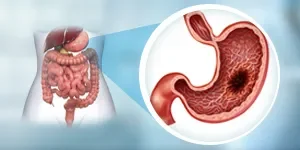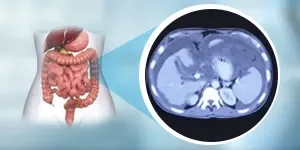Keeping the Right Temperature During HIPEC Can Help Patients Live Longer
Keeping the Right Temperature During HIPEC Can Help Patients Live Longer You are here >>…



Being diagnosed with cancer requires expert medical care. In Ahmedabad, Dr. Harsh Shah is well-known for his expertise in treating various types of cancers of the digestive system, providing the best CRS and HIPEC Treatment in Ahmedabad, Gujarat and across India. With over 10+ years of experience as a HIPEC surgeon, he's renowned for successfully helping numerous patients in their fight against cancer, earning acclaim for his exceptional skills and empathetic approach to care.
11750+ Patients have been successfully treated
15+ years of work experience
as a cancer specialist
24+ Awards received by Dr. Shah for his achievements

MS, DrNB(GI), MCh(GI)
Management of various types of cancer with the treatment of CRS+HIPEC involves prompt diagnosis & early treatment.
The cancers treated are colorectal cancer, gastric cancer, pseudomyxoma peritonei, peritoneal mesothelioma & primary peritoneal serous carcinoma.





Benefits of CRS+HIPEC over Traditional Treatments
⦿ It helps patients live longer, especially those with cancer in the belly lining.
⦿ It targets cancer spots directly, leading to better control.
⦿ It causes fewer side effects because the treatment mostly stays in the belly area.
⦿ It opens up new ways to treat cancers that were hard to tackle before.





Explore surgical videos & photographs with caution. Please be advised that viewer discretion is recommended.






We provide a 24*7 emergency care.
Yes, cashless treatment is available for HIPEC (Hyperthermic Intraperitoneal Chemotherapy), providing specialized care with minimal financial stress. Visit our Insurance Page for more details.
HIPEC provides numerous benefits:
⦿ Direct delivery of chemotherapy to the abdominal region.
⦿ Increased effectiveness of chemotherapy through heat.
⦿ Better tumor removal during surgery.
⦿ Reduced risk of cancer recurrence.
⦿ Potential for improved survival rates in specific advanced abdominal cancers.
Typically, patients can expect the following in terms of recovery:
⦿ Hospital Stay: Most patients stay in the hospital for 7 to 14 days after surgery. If there are complications, they may need to stay longer.
⦿ Early Recovery: The first few weeks after leaving the hospital can be tough. Patients may feel tired, uncomfortable, and have trouble moving around. It can take several weeks for the body to heal completely.
⦿ Full Recovery: It may take 6 weeks to a few months to fully recover. During this time, patients gradually regain their strength and get back to their usual activities. The exact timeline varies depending on the person’s health and the complexity of the surgery.
Direct Chemotherapy Application: Heated chemotherapy is circulated within the abdominal cavity post-tumor removal.
Targets Microscopic Cancer Cells: This method effectively destroys residual cancer cells that are not visible during surgery.
Localized Treatment: Concentrates chemotherapy in the abdomen, reducing systemic side effects commonly associated with traditional chemotherapy.
The survival rate for patients undergoing Cytoreductive Surgery (CRS) combined with Hyperthermic Intraperitoneal Chemotherapy (HIPEC) depends on various factors, including the type and stage of cancer, the patient’s overall health, and how well the tumor is removed during surgery.
Here are some general survival rate statistics for different cancers treated with CRS-HIPEC:
⦿ Peritoneal Mesothelioma: CRS-HIPEC has greatly improved survival rates, with reported median survival times ranging from 40 to 92 months.
⦿ Colorectal Cancer with Peritoneal Metastasis: Median survival with CRS-HIPEC ranges from 30 to 63 months, compared to 12 to 24 months with chemotherapy alone.
⦿ Ovarian Cancer: For advanced ovarian cancer limited to the peritoneal cavity, CRS-HIPEC shows improved survival rates, with median survival times ranging from 30 to 45 months.
⦿ Gastric Cancer with Peritoneal Spread: CRS-HIPEC can offer a median survival of 12 to 31 months, a significant improvement over chemotherapy alone.
⦿ Pseudomyxoma Peritonei: This condition responds well to CRS-HIPEC, with reported 5-year survival rates exceeding 80% in some studies.
Hyperthermic Intraperitoneal Chemotherapy (HIPEC) is a special treatment mainly used for cancers that have spread to the lining of the abdomen, called the peritoneum. Common cancers treated with HIPEC include:
⦿ Peritoneal Mesothelioma: A rare cancer in the abdomen lining often linked to asbestos exposure.
⦿ Ovarian Cancer: Especially in advanced stages where the cancer has spread in the abdomen.
⦿ Colorectal Cancer: Used when the cancer has spread to the peritoneum, particularly if it’s limited to the abdomen.
⦿ Gastric Cancer: When gastric cancer has spread to the peritoneum, HIPEC can be an option.
⦿ Appendiceal Cancer: Including pseudomyxoma peritonei, often linked to appendix tumors.
⦿ Other Digestive Cancers: Like some pancreatic, small bowel, and hepatobiliary cancers that spread to the peritoneum.
⦿ Primary Peritoneal Cancer: A rare cancer starting in the peritoneum.
⦿ Selected Sarcomas: Some cases of sarcoma that spread to the peritoneal surface.
Keeping the Right Temperature During HIPEC Can Help Patients Live Longer You are here >>…
Which HIPEC Drug Combination Works Better for Pseudomyxoma Peritonei? You are here >> Home >…
If you have any kind of Uro, Gynec, GI & HPB Cancers related medial emergency, visit Apollo Hospital. An expert doctors is always available & treatment will be provided at once.